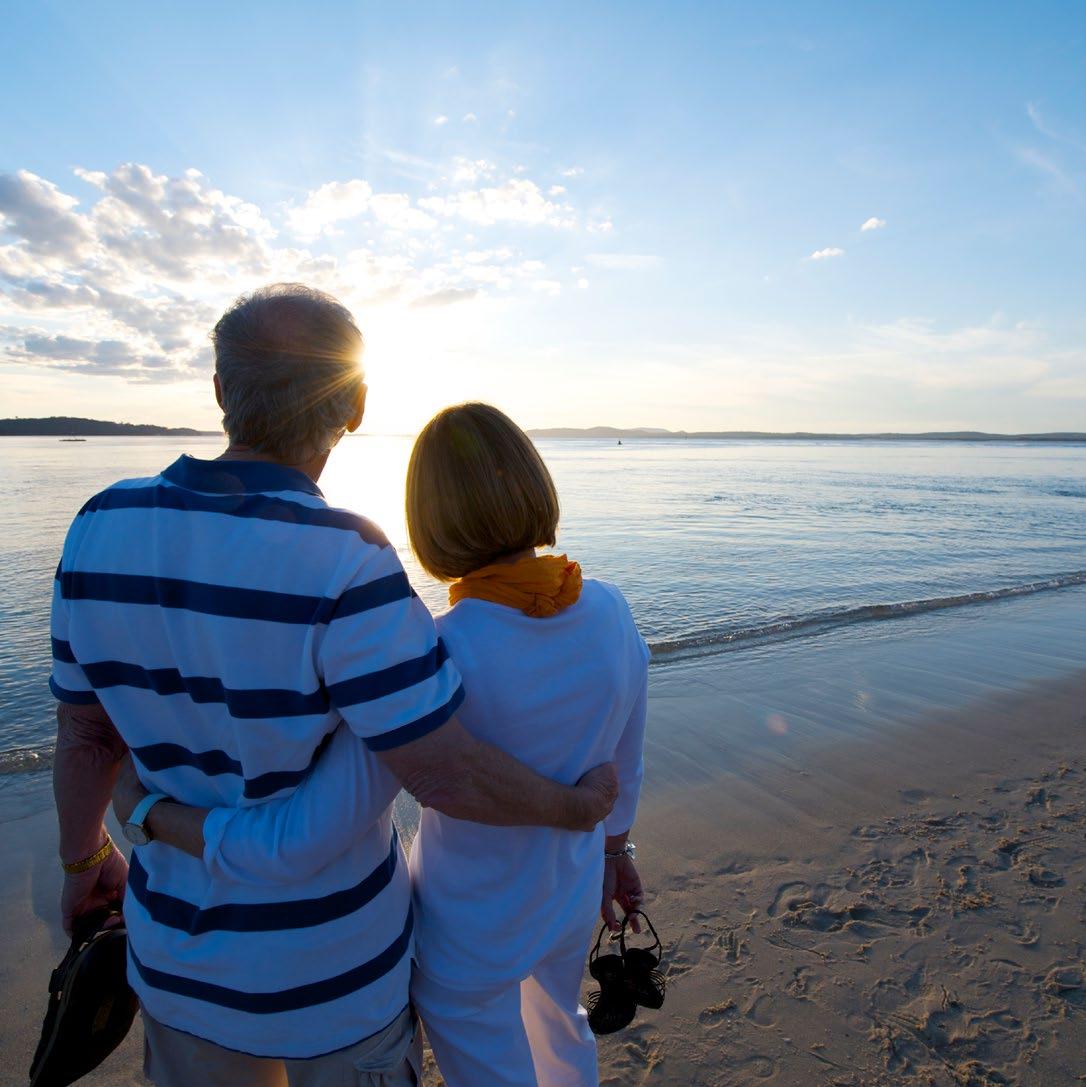better with age
A GUIDE TO THE GOOD LIFE FOR MODERN ELDERS IN PORT STEPHENS









A GUIDE TO THE GOOD LIFE FOR MODERN ELDERS IN PORT STEPHENS








Mind over matter
Resilience and our ability to adapt to life’s traumatic events may be the key to ageing gracefully.
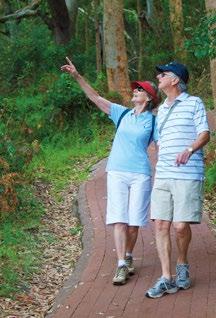
Local Legend:
Aunty Margo Beavan
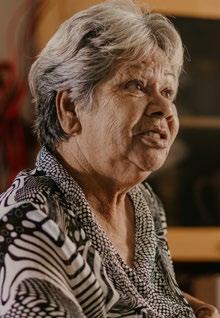
One woman’s journey to put the shattered pieces of her family back together.
Local Legend: Cheryl Turner
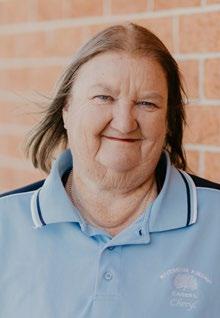
When grandparents take on the parenting role there are a lot of hoops to jump through.
Discover your own backyard
You’ll be amazed at the incredible experiences on offer right here in your own backyard.
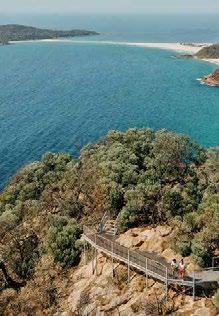
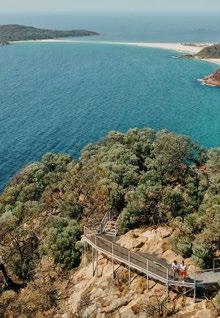
The Port Stephens local government area (LGA) is part of the Worimi Aboriginal Nation and is the traditional land of the Worimi people. We acknowledge the Worimi as the original Custodians and inhabitants of Port Stephens. May we walk the road to tomorrow with mutual respect and admiration as we care for the beautiful land and waterways together.

Tips and tricks to stay young at heart. You don’t have to act your age!

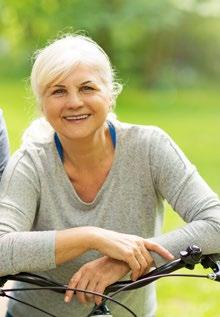

Local Legend: George Proskowiec
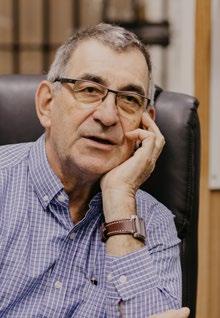
A tale of three generations, two counties and one clock tower.
Full Cycle – Take a Hike
Get healthy, get outdoors and enjoy the best.
Local Legend: Dave Sams
A larrikin with a ‘can do’ attitude, Dave just can’t help but help.

With around one third of all Port Stephens residents aged 55 and over, it’s time to acknowledge the wisdom and experience of our elders and help you embrace this time of your life in this incredible place we call home – Port Stephens.
If you live in Port Stephens you already know how lucky you are to be surrounded by our natural environment and have access to great facilities and a diverse community. But you might not be aware of the opportunities that are on offer to help you live your best life.
Whether you’re 55 and still working hard towards retirement, or a sprightly 95, connecting with others is the key to keeping a healthy mind. Port Stephens has many ways to help you make the right connections.
From volunteering your gardening expertise or caring for koalas to putting your hands to some woodwork or exploring the sites on a bike! There are opportunities to look into your ancestry or enjoy early morning swims, play a round of golf or try a little tai chi or yoga.
‘Better with Age’ is a guide designed to increase community connection, celebrate the diverse nature of our community and inspire you to make
the most of all that’s on offer in this incredible place we call home.
We’ll introduce you to some local legends with stories that’ll break your heart and lift your spirits. We’ll help you find the services you need, show you things you didn’t know existed and help you stay connected.
So before you say “I’m too old for that” take a wander through ‘Better with Age’ and you’ll discover ageing isn’t ‘lost youth’ but just a new stage of opportunity!
This is your chance to celebrate everything your decades of wisdom and experience gives you.
We think you’ll agree we’re all getting ‘Better with Age’.
Ryan Palmer Mayor of Port Stephens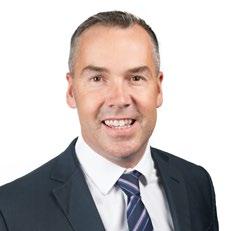
“We don’t stop playing because we grow old. We grow old because we stop playing”
George Bernard Shaw
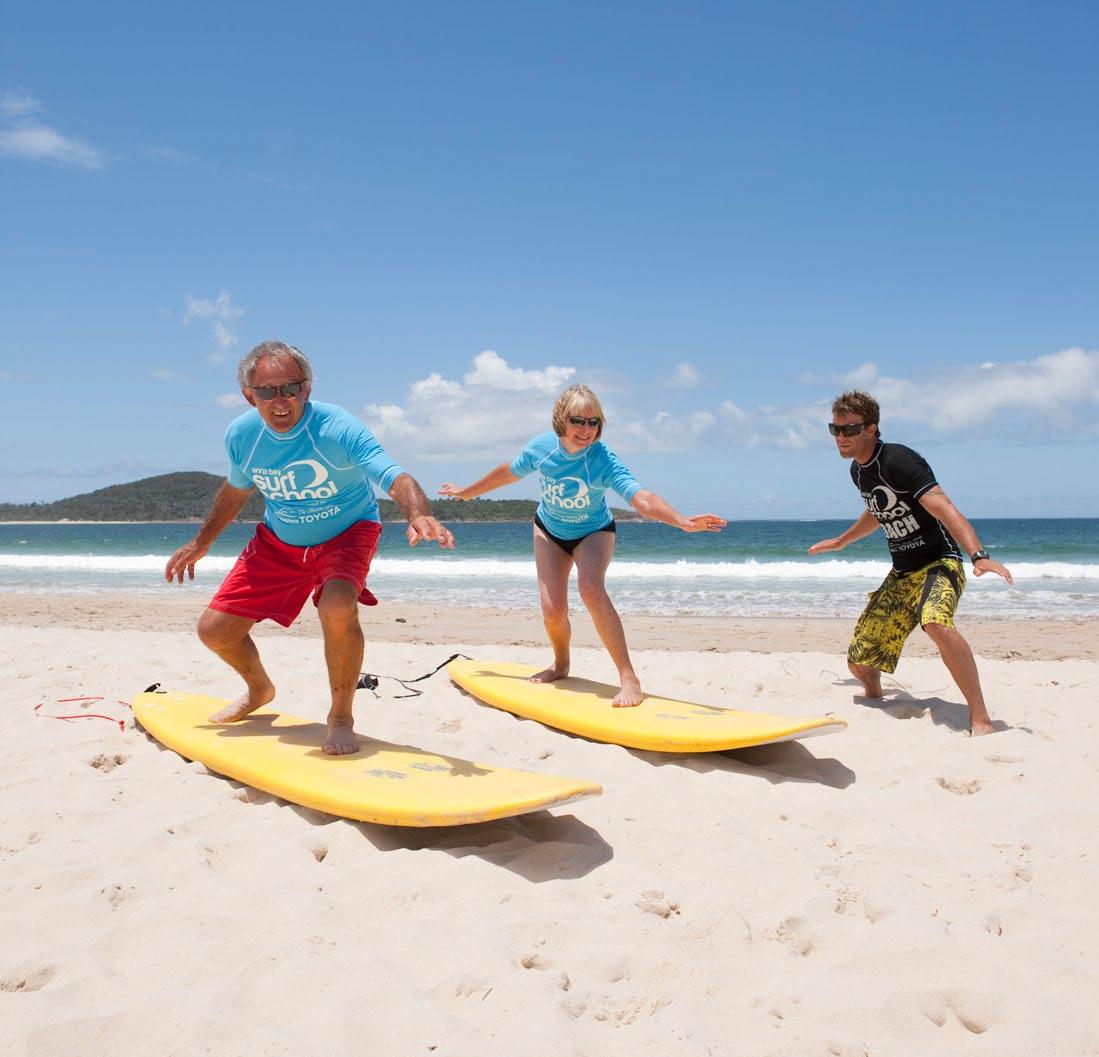
While some may view the ageing process through the lens of increasing physical and mental limitation, others celebrate the sense of anticipation and wisdom that comes with age. So how do we adapt more positively to life’s challenges and why do some of us approach getting older with a sense of excitement, while others, a sense of fear?
The answer is resilience – or specifically, the way those aged 55+ are able to adapt in the face of adversity, trauma, tragedy, threats, or significant sources of stress.
The Flinders Centre for Ageing Studies 2015 report, “Ageing Well: Building Resilience in Individuals and Communities”, found that having a higher sense of purpose in life and a more optimistic outlook buffered against the association between negative life events.

The report says, “People with more flexible coping styles who are able to both persist with attainable goals and redefine or replace unattainable goals, had lower levels of psychological
distress irrespective of the number of negative life events they reported.” Fortunately, resilience can be learned. A 2016 study published in Geriatric Nursing showed that there are several characteristics in three key categories shared by those aged 65 and over who were able to face challenges and come out the other side.
Mental characteristics: Adaptive coping styles, gratitude, happiness, mental health and optimism or hopefulness.
Social characteristics: Community involvement, contact with family and friends, a sense of purpose and positive relationships.
Physical characteristics: The ability to remain physically independent and mobile, enjoy good health and the belief that they were able to age successfully. These and other findings suggest that all Australians have the capacity to build and demonstrate resilience, regardless of socioeconomic backgrounds, personal experiences, or social environments.
“Getting older is like climbing a mountain – you get a little out of breath but the view is much better”
Ingrid Bergman
1. Maintain an optimistic attitude
2. Maintain perspective –don’t let your thoughts run away with you
3. Engage in new activities
4. Cultivate new friendships or join a social group
5. Accept that some things are out of your control
6. Take action on things you can impact
7. Practice stressmanagement techniques
8. Consider developing a spiritual habit like prayer, meditation or yoga
9. Practice self-care, proper nutrition, regular exercise and good sleep habits
10. Volunteer your time to help others

Sitting at her dining table in a home that proudly displays family photos, a carved dolphin, and samples of her weaving, Worimi elder Margaret Beaven, also known as Aunty Margo, talks about the day she recited her poem for the 60th Anniversary of her siblings returning home.

Aunty Margo wrote ‘My Journey’ in one night, the words pouring out of her and onto the page. The story the poem tells is like one of Margo’s weavings, taking the disparate threads of her past and bringing them back together again.
When Aunty Margo recites her poem, it is in a strong and proud voice that doesn’t waver. Still, the emotion of growing up and suffering the traumatic effects of being part of the Stolen Generation is just beneath the surface. Her pain breaks through conversation in pauses that give space to her grief.
“I’ll tell you this story,” Margo says. “I did my poem at Hunter River High and
one of the teachers of one of the boys, they had to bring him down to me. He was crying. My story made him sad.
“I took him out to the table and I said, ‘I was sad. But now I’m happy. I’ve found my family.’
The kids that are taken and then they don’t connect to their culture, they don’t know who they are, where they come from … their country. You know, it’s so hard for them because they don’t know. They weren’t told.”
Margo is finally embracing a stage of life where she can say that she is happy and relaxed. She chats fondly about her children and grandchildren, accomplishments including studies in cultural arts, horticulture and conservation and land management, and work that reflects her care for people and the environment.
The journey has been fraught, though, involving years of seeking out and connecting with siblings in a family
Your hearts were broken the day the welfare came. Things would never be the same. You suffered in silence, never speaking a word.
Hearing you cry, that’s what I heard. Never thought this day would come when I’d find my family, one by one.
fractured by the forcible removal of its children.
Like much of her life, Margo’s childhood at Karuah Mission, known as “Karuah Mish”, is intertwined with both fond and painful memories.
“We had a creek where we spent a lot of time swimming. We’d hire boats from the boat shed and go fishing all day. We only went home when we were hungry. We’d go mushrooming and get blackberries,” Margo says.
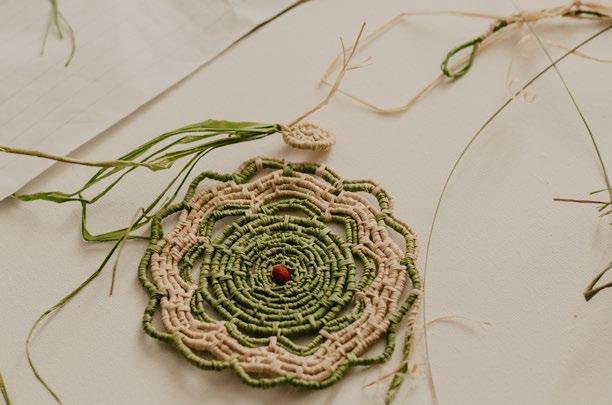
“Years ago the oldies would say you should be seen and not heard. You were told to go and play. Aunty Col would have 16 kids or more at home. We lived on kangaroo. She’d put on a kangaroo leg with garlic in it and it tasted just like a leg of lamb with gravy and all the veggies. And fish. We ate a lot of fish.”
Margo spent many years living with her Aunty at the Karuah Mission.

“I stayed with mum until I was around ten. One day my cousin Denise asked if I could go and have Sunday dinner. I went and had Sunday dinner and I stayed until I was 18,” Margo smiles.
Bringing to mind her school days is a different story with painful recollections of the way Aboriginal children were singled out from their peers.
“Going to school, I was terrified,” Margo says. “You know, when we went to school we had to have our worming tablets and our heads checked for head lice. Only the Aboriginal kids had that done. I was so embarrassed going to school. I didn’t want to read out of a book in case I pronounced something wrong.”
Margo was born two years after her siblings were taken from their mother while her father was at work.
“Mum didn’t speak much. In the paperwork, they said that Mum couldn’t make conversation. When I
hear that, I think, why didn’t she ever get to see [her children], regardless of why they went?”
Margo’s elder sister, Jenny, came home when she was 18 after being removed at the age of five. Margo was just eight and remembers everyone in tears. As a young adult, Margo was determined to find her other siblings, receiving assistance to do so from Link-Up (NSW) Aboriginal Corporation, an organisation formed to help Aboriginal people reunite with family members following their separation through forced removal. She eventually connected with her brother Peter, a strapper who undertook his apprenticeship with Tommy Smith and worked with champion thoroughbred Kingston Town.
“He had his little room at the stables. His birth certificate showed that he was born on Karuah Mish. When I got married, he gave me away. He had
a son and moved to Queensland. One day we got a message to say my brother had been diagnosed with cancer. He died on my birthday.”
Margo was also reunited with her sister Betty, who was subject to a cruel upbringing after being removed from her family.
“Bet had a bad experience. She used to pick up a little boy and take him to school, and they’d take every cent off her. When she came home, she wanted her belongings and they sent them in a little bag. She had nothing.”
Later in life, Bet wanted children, but that option had also been taken from her.
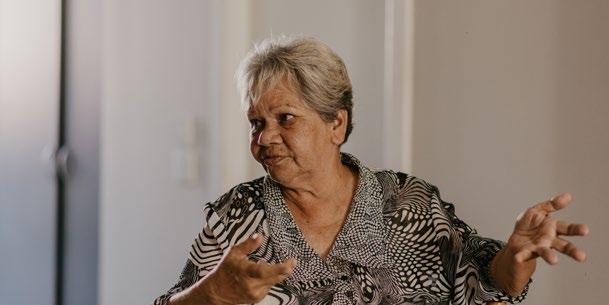
“She wanted to have a baby, but her tubes had been tied and she couldn’t. She loved kids. She was so loveable considering the way she was treated,” Margo says.
Margo only got to meet her sister Judy after Judy realised there were discrepancies with her birth certificate. It stated she was born in 1955, but her birth was not registered until 1960. The sisters had been separated
from each other for 56 years before they finally met, with Judy having no knowledge that she’d been adopted
By then, it was in many respects too late. Judy didn’t ever get to meet her Mum and Dad or her other siblings. Margo and Judy’s reunion was also bitter-sweet. Margo had been living just a short distance away. The sisters had likely passed each other at the local shopping centre without even knowing of each other’s existence.
“When we met, Jude said, ‘who do I look like?’ and I said, everybody.”
Even now, those who remain continue to bring their family together again. A mural Margo designed hangs in Irrawang Public School’s Assembly Hall. It includes a set of footprints returning. “That was Jenny coming home,” she says.
And in 2015, Margo commemorated the 60th anniversary of her siblings returning home by putting her brother’s ashes with her mum on the day.
“Irrawang Public School and Hunter River High School students came up
to Karuah. They’ve been good to me,” she said.
“Jude and I would also like to bring my father home to Karuah. I had my mum’s grave done and I’ve got all [the family members’] names on it. Even dad’s.”
The headstone bears a heartbreaking inscription: Child loss is not an event, it’s a journey of survival.
“A lot of kids don’t know where they come from,” Margo says.
“It’s sad knowing there are Aboriginal kids out there who haven’t had connection. They never had a chance. It didn’t hit me until later on what Mum must have gone through. She kept to herself.
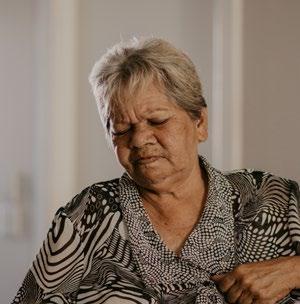
“We used to have a big open fire and Mum would sit there looking into it. I wonder what must have been going through her head. She wasn’t able to speak for herself and I’ve been able to give her that. I think that’s what drove me to search for my siblings. [Her voice] was taken from her. That was my reason.”
Author: Joanna Atherfold Finn Photographer: Laura Grzelak, Little Mary Media
Scan the QR code for up to date information
Sometimes you just need a little help, no matter your age or cultural background. Here are some of the services in Port Stephens to help you.
When you’re looking for support, Ask Izzy can help you to find the services you need. It’s free and anonymous, and you can search to find housing, meals, healthcare, counselling, legal advice, addiction treatment and more. Visit askizzy.org.au
Awabakal’s Medical Service is an Aboriginal community-controlled health service, which aims to deliver culturally-appropriate primary health care services, advocacy and social and emotional support to Aboriginal people and their families in our community. Call 4907 8555
Scams can be, but are not limited to, over the phone, text message or email. Look out for generic greetings, mismatched font in the one email, a strange looking phone number and if you have to identify yourself. Visit scamwatch.gov.au
Are you up to date with the latest road rule changes? Do you know what happens with your driver’s licence as you get older?
Visit transport.nsw.gov.au
If you need some help around the house or think it’s time to look into aged care homes, My Aged Care is here to help. Visit myagedcare.gov.au
This is a vibrant club which always welcomes new members and visitors. Meetings are held at 1:30pm every Saturday at the Nelson Bay Bowling and Recreation Club, 1 Stockton Street Nelson Bay. Call 4919 1495
NSW Family and Community Services
Now under the banner of NSW Communities and Justice, the NSW Government’s Family and Community Services offers a wealth of information and resources for aged care support and services.
Call 1300 205 268 or 4909 3033
Service NSW Service NSW offers a range of concessions, rebates and assistance to people from all walks of life. Visit service.nsw.gov.au
The NSW State Emergency Service (SES) is a group that assists in flood, storm and fire emergencies.
Call Port Stephens SES Pacific Hwy Ferodale on 132 500 or go to ses.nsw.gov.au
Telecross – Red Cross
Red Cross can provide you with a daily telephone call to check on your wellbeing through a service known as Telecross. This provides peace of mind if you are at risk of an accident or illness that may go unnoticed. The volunteer will check to see that you are well and provide a friendly voice to wake up to each morning.
Call 1300 885 698
Wahroonga Aboriginal Corporation
This service connects local Indigenous families and individuals to the services and programs they need.
Call 0432 563 018
Wheel Out, Wheel in Bin Service
Port Stephens Council and Suez provide a Wheel Out, Wheel In bin service for elderly or sick residents who require assistance in taking their household bins out to the street.
Call 4988 0255
On any given day, if you popped into a Men’s Shed, you might see a bunch of industrious blokes of all ages beavering away at woodowork, metal work, gardening and general tinkering at all manner of machinery. But what you won’t see are all the hidden benefits this community-based, non-profit organisation brings to all its participants.

On the surface the Men’s Shed provides a safe, friendly and active environment where men are able to work on meaningful projects at their own pace, in the company of other men. When you dig a little deeper you’ll see a sense of purpose, companionship, emotional support, heartfelt conversations and mates generally looking out for each other. The mental and physical health and well being benefits of the Men’s Shed organisation cannot be overstated. Most men have learned from our culture that they don’t talk about feelings and emotions and many do not take an interest in their own health and well-being. Unlike women, most men are reluctant to talk about their emotions and that means they
usually don’t ask for help. Probably because of this, many men are less healthy than women, drink more, take more risks and suffer more from isolation, loneliness and depression. Relationship breakdown, retrenchment or early retirement from a job, loss of children following divorce and physical or mental illness are just some of the problems that men may find difficult to deal with on their own.
Good health is based on many factors including feeling good about yourself, being productive, contributing to your community, connecting with friends and maintaining an active body and mind. Becoming a member of a Men’s Shed provides a safe and busy environment where men can find many of these things in an atmosphere of old-fashioned mateship. And, importantly, there is no pressure. Men can just come and have a yarn and a cuppa if that is all they’re looking for.
Members of Men’s Sheds come from all walks of life – the bond that unites them is that they are men with time on their hands and would like something meaningful to do with that time.
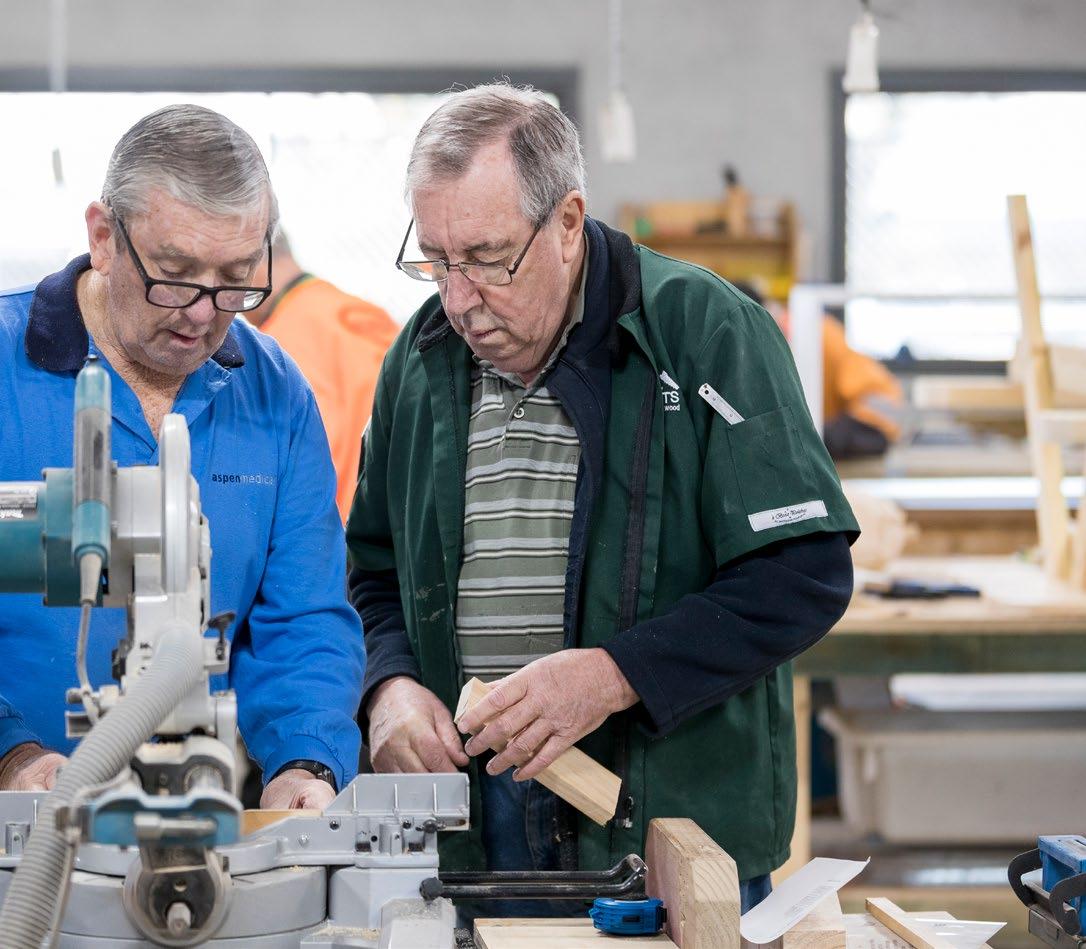
Salamander Men’s Shed 360 Soldiers Point Road, Salamander Bay 4984 6244
Guparr Aboriginal Men’s and Youth Shed 13 Leisure Way, Raymond Terrace 0415 124 688
Karuah River Men’s Shed 9 Memorial Drive, Karuah 4997 5009
Tilligerry Men’s Shed 1195 Lemon Tree Passage Rd, Mallabula 0407 279 844
Raymond Terrace Men’s Shed 17G Irrawang Street, Raymond Terrace 4983 2580
Rugged up in scarves and winter jackets on a blustery day in June, a group of people huddle around a table clutching cups of tea and snacking on biscuits.
The camaraderie and warmth contained in the brick-walled building in Kings Park Sporting Complex is unmistakeable – conversation flows as these grandparents chat about life’s ups and downs. Despite their ages and aspirations, traditional retirement is not on their horizon quite yet. Instead, they meet to work through the challenges and joys involved in not just being active grandparents, but fulfilling the role of raising their grandchildren.
Cheryl Turner and her husband Vernon know all too well the support grandparents need as they navigate the responsibilities of caring for another generation of children. With four children of her own, Cheryl has spent
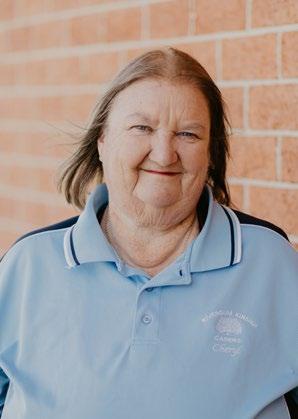
over a decade also raising her 14-yearold grandson.
“I’ve pretty much had him from the day he was born. My son and daughter-inlaw were living with us for a little while, but things didn’t work out between them. For the last 10 years, he’s been in my care.”
The arrangement started off as a formal one through the Department of Communities and Justice, and is now a family arrangement. Cheryl’s grandson has never known it to be any other way.
“Since starting school, his mates have always known he lives with his grandmother, so it has never been an issue,” Cheryl says.
And although the path hasn’t always been smooth, the dynamics of the arrangement have settled in recent years. Cheryl now has a good relationship with her daughterin-law, and her grandson visits his mum “quite often”.
“Any time you need someone, just pick up the phone and I’m there.”
Cheryl Turner
Currently contending with the challenges of raising a teenager, she reflects on how different the environment is to the one she brought her own children up in, but remains upbeat.
“I’m very lucky. He’s a really good boy. Academically he is doing really well,” Cheryl says, “but it’s very different to raising your own children. It’s now in an age of technology. I’m learning a lot more. I think I have more patience. They tend to get away with a bit more now,” she says.
Other relationships have changed too. As their peers started to enjoy the more leisurely and carefree lifestyles many of us look forward to when our working lives comes to a close, Cheryl and Vernon were back doing the rounds of homework, supervision and mentoring.
“You do lose some of your old friends because you are doing it all over
again and they’re off holidaying,” Cheryl says.
“We are starting to look forward to that stage now, but we can’t just go at the drop of a hat.”
Traversing the difficult path of taking on the physical and emotional demands of parenting again made Cheryl realise that the many people who had found themselves in the role of kinship carer or grandparent carer needed more than the ‘Tea and Sympathy’ group she had been attending. With others, she formed the Rivergum Grandparents as Parents Group, a self-funded incorporation made up of men and women who may not have the energy they once had to run around the football field, but who make up for it with a wealth of knowledge and the sort of practical advice invaluable to those who find themselves in the same situation.
With deteriorating health (and superannuation nest eggs), they meet every Friday. It’s given Cheryl an opportunity to pass on the experience and companionship she once craved, to those facing similar challenges.


“Any time you need someone, just pick up the phone and I’m there. Someone will always come to a meeting with you. Don’t think you’re alone. We have 35 families and 63 children and we’ve made lifetime friends. You would be amazed how many are out there.”
The support is far-reaching and moves beyond sharing stories to hands-on advocacy and assistance.
“We help people navigate the Department of Community and Justice, so we advocate and go to meetings which can be very informative, and confronting at times,” Cheryl says, reinforcing the need to keep a comprehensive paper
trail to ensure family arrangements are watertight.
“You get families that walk in and they know nothing. I knew nothing about what help was out there. Now I’ve got the knowledge and I can help others through things.”
While the grandparents support each other, the children and young adults in their care have an outlet with others who know exactly what they are going through.
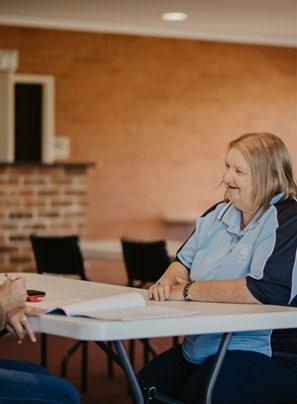
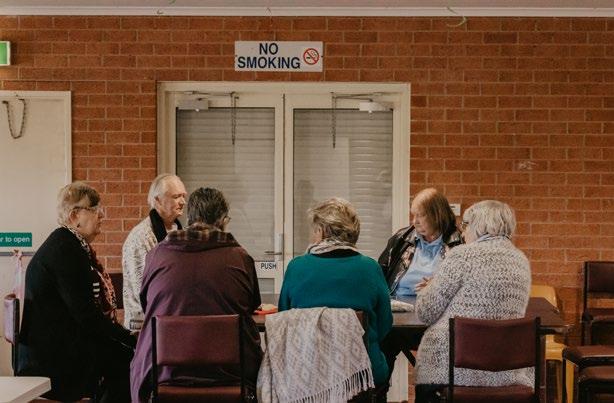
“They get to meet and know that they are not alone,” Cheryl says.
“It’s amazing how many of them say, ‘But you go to my school. I didn’t know you were with your nan.’ So that helps.”
Together the families raise funds for outings by “selling an awful lot of sausages at Bunnings” as well as linking in with organisations such as The Mirabel Foundation and Friends With Dignity that provide assistance
such as school and sporting supplies. It’s invaluable, as many of the grandparent carers and kin carers have suffered from the financial impact of raising another family without any government assistance.
Cheryl and Vernon are now at a stage where some free time is becoming a reality. They plan to explore as much of Australia as they can.
“I can see myself in that big, beautiful van we’ve purchased. Travelling around. That’s where we see ourselves.”
With their grandson now returning to his mum’s place during the holidays and working in her coffee shop, Cheryl describes life as the family “coming full circle”. And despite the obvious challenges, she gives the impression that she’s gained far more than she could have imagined.
“What makes it worthwhile? Watching him grow and seeing the smile on his
face. I’ll make tea and he’ll say thank you. Or the times when he walks out and tells me that he loves me.”
She clasps her hands together. “The hugs have gone,” she laughs, her expression suggesting the mixed emotion we feel when those in our care enter the next stage of their lives, and, knowing we’ve done all we can to guide them into adulthood, we enter the next stage too.
Author: Joanna Atherfold Finn Photographer: Laura Grzelak, Little Mary MediaGrandparents as Parents Group meet every Friday to share experiences, knowledge and friendship
Social connection for seniors is critical, playing an essential role in mental, emotional and physical health. Seniors with a strong social network have a better quality of life and experience superior overall health and wellness.
Hunter Region Botanic Gardens
Get out in nature, meet more green thumbs and help our gardens grow. Be a guide, help with propagation and conservation or get your hands dirty in the garden. Call 4987 1655
Libraries, Stories and Art Space Volunteers
Port Stephens library volunteers assist in children’s programs, book shelving, book care and exhibitions in the Art Space. Stories in the street volunteers visit families at home and read stories to children aged 0-5yrs.
Call 4988 0255
Men’s Sheds
There are many Men’s Sheds across Port Stephens all encouraging social inclusion and meaningful activity in a safe non-judgemental environment for men. See page 12 to find a Men’s Shed near you.
Parks, Reserves and Landcare
Parks, reserve and landcare groups provide assistance with the maintenance of local parks and reserves as well as bush regeneration, habitat improvement and weeding activities. Visit landcareaustralia.org.au
Port Stephens Family and Neighbourhood Services
This service connects volunteers to the communty where help is needed. Register to become a volunteer, meet like-minded people and help those in need. Call 4929 4424
Port Stephens Veterans and Citizens Aged Care Volunteers
Assist the elderly residents of Port Stephens Veterans and Citizens Aged Care Hostels and Nursing Home at Shoal Bay and Fingal Bay. Drive buses to functions or help out at the Day Respite Centre. Call 4984 1811
A volunteer group who help and support grandparents as parents and all kinship carers when they take family member’s children into care. Meet every Friday 10am to 12:30pm at Kings Park Sporting Complex Raymond Terrace. Call 0403 688 724
The Ngioka Centre provides an opportunity for volunteers to grow and care for native plants in partnership with Council. These plants are used by our groups for their activities in local parks and reserves. Volunteering
opportunities include horticulture, gardening and maitenence. Call 4984 3487
The Port Stephens Friendship Group
A community-based group where you can make connections, widen your friendships and enjoy social activities such as dining, barbeques, movies, fishing, lawn bowls, walks etc. Meets on the last Tuesday of each month at 5pm at Nelson Bay Bowling Club. Call 0417 439 632
Whether you want to make a handson contribution, gain new skills, help others, share your own knowledge and experiences, or just stay active and form new friendships, Port Stephens Council may have just the right thing for you. Visit portstephens.nsw.gov. au/volunteer
Embark on a journey of discovery in your own backyard!
Where else can you explore giant sand dunes, get up close to local dolphins and visting humpbacks, sail to deserted islands, climb a mountain, dive in coral gardens, ride bikes through beautiful bushland, find a beach with no one else on it, or watch a spectacular sunset from the deck of a yacht.
Be a tourist in your own town and get out of your comfort zone. Try kayaking around the bays, take a surfing lesson, ride a horse across the dunes or hire a quad bike, take a fishing charter or do the coastal walk.
Discover your Port Stephens –Incredible by Nature.
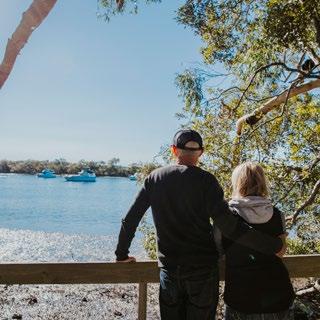

Worimi Conservation Land – The local Worimi National Park features the monumental Stockton sand dunes as well as the unique Tin City and traditional Aboriginal sites such as the shell middens. Explore the dunes by quad bike, on horse back or on a camel ride.
Tomaree National Park – For the best sunrises and stunning views take the Tomaree Head Summit walk. Whales can often be seen travelling up and down the coast from here during peak months. Don’t miss Fort Tomaree and its historical gun emplacements.
Tilligerry Habitat Reserve – Take the easy boardwalk through this 9 hectare flora and fauna reserve along a sandy foreshore on Tanilba Bay between the townships of Tanilba Bay and Mallabula.
Hunter Region Botanic Gardens – Easy walking trails provide access to the 130 hectares of bushland with its mature blackbutt, angophoras and swamp mahogany forests and its understorey of more than 150 native plants. Take a tour or enjoy devonshire tea.
Port Stephens Koala Sanctuary – See koalas in their natural habitat on the SKYwalk and elevated viewing platform. There are informative educational tours, the Koala Hospital and the Sanctuary Story Walk pathway to enjoy as well.
Seaham Swamp Nature Reserve – Whether you’re interested in birdwatching, Aboriginal heritage, bushwalking or natural history, the Hunter region’s Seaham Swamp Nature Reserve offers a memorable experience. Also a great place for a walk at any time of year.
Great Lakes Marine Park – Ideal for fishing and viewing dolphins and whales, the park is also home to the state’s largest brackish barrier lake system as well as Broughton Island and Cabbage Tree Island – the primary breeding site for the threatened Gould’s petrel.
Gan Gan Hill Lookout – A great spot to take in spectacular views of Port Stephens and the surrounding areas including the headlands of Tomaree and Yacaaba, the Stockton sand dunes and Tomaree National Park. The viewing platforms have wheelchair access.
Little Beach – Tucked away between Nelson Bay Beach and Shoal Bay Beach, Little Beach offers calm water swimming, grassy areas with BBQ’s for picnics, a playground for the kids, a boat ramp, a jetty for fishing and protected areas of Marine Park for snorkelling.
Whale Watching – Port Stephens, located right in the middle of the Humpback Highway has a range of vantage points along the coastline to see humpbacks breaching and southern rights spy-hopping between May and November. Or get up close on one of the eco-friendly whale watching cruises.

Young at heart is defined in the dictionary as; ‘thinking and acting like young people; active and having lots of energy.’ Here’s some advice from ‘young elders’ on how to stay young at heart.... they have years of experience at not acting their age!

1. Don’t look in the mirror Seriously, don’t. We are our own worst critics. What we see when we look in the mirror is someone who is our age –the laugh lines, the “battle scars”, the gray or non-existent hair. While others will see someone fun to be around, who gives good advice, and is an allaround good friend.
2. Find something you loved doing when you were younger, and try it again
If you loved playing sport or singing when you were younger why not give it a go again? You never know, it might just be like riding a bike! You could even compete in the Masters Games. It’s great fun and helps make likeminded connections.
3. Helping hands – be active in your community
Doing something for someone else is one of the antidotes for depression. Volunteer at the local homeless shelter or women’s refuge. Help prepare meals or make blankets for children and for the elderly. Volunteer to count
dolphins in the dolpin census, serve Christmas dinner to the homeless or help out at the animal rescue.
4. Exercise your mind and your body Exercise every day and find things about life to enjoy – family, volunteering, etc.
5. Turn away from negative people You might know these people: “energy vampires” because they will suck all your energy from you if you let them. You’re better off to have your circle of friends include those who are setting goals and making plans to achieve them rather than ones who are playing the blame game or holding their own pity party.
6. Get rid of things that are bogging you down
This recommendation is multi-faceted. For some, it can mean that you don’t need to keep your mother’s piano around anymore because she’s not in it, she’s always in your heart. For others, it can be ridding yourself of guilt from years past. You can’t change whatever it was, so let’s make new friends and enjoy new experiences.
When we’re young, we’re filled with curiosity and wonderment over the smallest things in life – a creek,
clouds in a blue sky, a rainbow. Just being in that moment and savouring it. Remember these feelings and opportunities to let your inner child always be with you. There are always occasions to learn something new or explore a place you’ve never been.
8. Stay connected and engaged
It’s important as we grow older to not let our circle of friends get smaller and not to become sedentary. If you retire, you should have a plan for something to do after retirement. Interaction with friends, community and family is important.
9. Have faith
Having faith in the goodness of other people and faith in something that is bigger than yourself is an essential element of remaining young at heart.
10. Live the adventure
Travelling helps you live life to its fullest, to meet new people, and to encounter new ideas. Immersing yourself in nature is a whole new world of discovery that can be as close as your backyard and can be experienced relatively inexpensively –hiking, birdwatching, etc. It’s important to maintain an open mind.
11. Laugh
Humour and laughing are important to staying young. Learn to laugh at yourself, don’t take yourself so
1 Take a yoga, pilates, or tai chi class with a friend or do it at home. A regular exercise routine helps strengthen your bones and prevent injuries. It also helps reduce mental and physical stress.
seriously or you’ll miss an opportunity to release endorphins, which promote well-being.
12. Make up your mind
Not getting old is mind over matter. We require two things before getting out of bed each morning –
1. You have a choice to be happy or sad. So choose to be happy.
2. Everyone you meet, plan to make them smile. That in turn will put a smile on your dial.
Remember, age is just a number, and shouldn’t hold you back from living your best life.
No matter where you are in your life’s journey, you can take action to remain young at heart.
2 Learn something new. Cognitive abilities don’t necessarily decline with age. Lifelong learning offers many benefits for senior well-being and can enhance your mental and intellectual wellness. The Port Stephens University of the third age (U3A) offers an opportunity to learn new skills without pressure.
3 Volunteer in your local community. Studies show that those who volunteer regularly experience positive mental and physical health outcomes, such as reduced stress and lower blood pressure. Try caring for sick koalas, work in animal shelters, help out landcare, or assist the elderly.
4 Take a walk! A regular walk can help you improve endurance, strength, balance, and flexibility. It also gets you outside and connecting with others.
5 Sing or play music. Music improves mood, calmness and reduces aggression. Singing improves circulation and deep breathing, resulting in less stress and more “feel good” hormones. Singing in a group is even better!
A ticking journey of a lifetime

The clock tower at the intersection of William and Port Stephens streets in Raymond Terrace is a familiar landmark. Less familiar is the story of George Proszkowiec who, with his family, keeps it ticking.
In 1955, the clock was donated to Raymond Terrace by the Raymond Terrace Rotary Club. Just a few years later, George, a young boy about to turn eight, was in the process of migrating from Poland with his brother, Peter, and their parents, Wladek and Marta.
Today, the Proszkowiec family is as much a fixture in the Terrace as the clock tower. Their story is one of family connection, decades of hard work, and a touch of fate.
“Poland was a communist country and my father always had the view that he wanted to see how he could create a better life for his two sons,” George explains of their move to Australia.
The journey started from the family’s hometown Cieszyn on the PolishCzech border. Following a train ride to Vienna, then Genoa, they boarded The Sydney on a boat voyage that took over two months. George has strong memories of the trip.
“I remember persuading my parents to buy some bananas. We’d never seen bananas in our lives. They told us we wouldn’t like them and we didn’t. I also remember eating roasted chestnuts and going through the Suez Canal … when the ship stopped at Aden, Yemen, there were a lot of hawkers and peddlers in small boats. My parents bought me a toy gun and I towed it behind the boat on a piece of string, but the string broke.…”
Docking in Sydney, George and his family were collected by his uncle Henry in that classic symbol of Australian life – an FJ Holden. They stayed in Henry’s home before
Following a train ride to Vienna, then Genoa, they boarded The Sydney on a boat voyage that took over two months.
moving into a refurbished shed just near the railway station at Beresfield. Wladek gained employment at the Courtauld textile factory in Tomago and eventually Wladek and Marta were able to purchase their own home at “Pommy Hill”, a move that would cement their lives within the Raymond Terrace community.
Their work, however, was less stable. An economic downturn led to Wladek losing his employment, though the initial blow and subsequent change in circumstance ended up being fortuitous. In between contract jobs, Wladek and Marta were taught the art of watchmaking at Henry’s jewellery shop in Hunter Street, with Marta becoming the first female qualified watchmaker in Australia, and Wladek landing a job at Waltons running the watch and clock department.
Time was on their side. In another twist of fate, a shop in Raymond Terrace became
available due to its owner’s ill health. Wladek and Marta negotiated to buy out the former owner’s debt from creditors, purchased the original jewellery shop site and, in 1967, the jewellery business now known as Terrace Showcase Jewellers was born.

George has fond memories of his family working together to establish this new venture as they quickly made friendships in the community, including with other families of Polish origin.
“In the school holidays I would go into the shop and help when things were busy. My parents were very well accepted in the community. For me, the fascination of the shop came from being able to talk to people. It wasn’t a chore. As a family we did things together. One of the jobs I had as a kid was to hand wind 100 girls’ and 100 boys’ watches at Christmas time. It was just something you did.”
The family quickly learned to speak English with George’s parents learning the language via correspondence and the brothers speaking English at home to improve their proficiency.
Marta, an avid reader, quickly grasped the language through her love of books. More difficult was getting used to the sales side of the business after coming from a communist country.
“I remember my mother saying the first problem she had to overcome was taking money from people when they bought something,” George says.
The small jewellery shop flourished, selling popular items of the era including compacts, Glomesh bags and water sets. Wladek’s entrepreneurial skills came to the fore and he eventually set up another shop in Nelson Bay.
Despite the businesses thriving, though, personal circumstances would

coronary in the late 60s. He recovered, but medical advances were not what they are today and a few years later, when Marta was overseas, Wladek had another coronary attack. In 1974, on Australia Day, he passed away.
George describes himself as “a bit of a lost soul” after the loss of his father. He travelled, returning to Poland where he worked with a goldsmith. Fate struck again when he met a woman named Elizabeth who would later become his wife.
“She was born in the same town as me, though our families didn’t know each other,” George says.
On his return to Australia with Elizabeth, George became fully involved with the family business. Following in his parents’ footsteps, the couple bought a house and Marta created a company for the jewellery business, giving a share to her 2 sons.
Over the years, George has undertaken courses in gemmology and jewellery valuing, constantly adding to his professional experience and growing from that young schoolboy winding watches in his
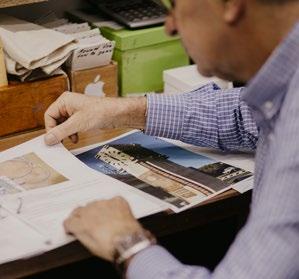
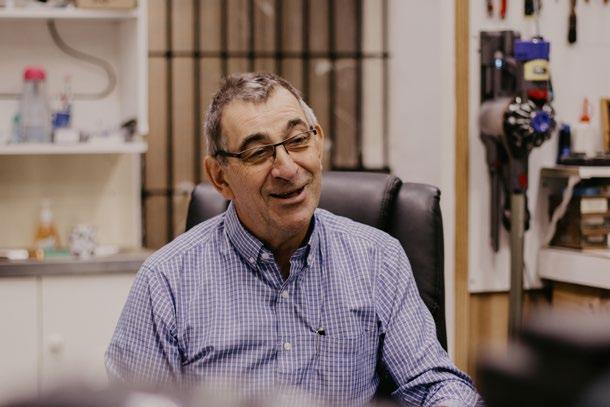
Raymond Terrace, but expanded into spacious premises with a focus that has also adapted with the times.
“We are a specialised business,” George says. “A lot of what we do is creating designs and doing made to measure items. We also reconstruct jewellery. Technology has progressed a long way.”
While much has changed, the important things have stayed the same.
“I guess jewellery has become a commodity,” George says, “however the fundamentals are still there. It’s not so much the jewellery’s value as its symbolism. The tradition or sentiment behind it.”
Now a father himself, with 3 children and 3 grandchildren, that sentiment is clear in the ring George’s children created for him for his 70th birthday.
“Their first initials are on it,” he says, pointing to the treasured ring. “It has a sunrise, I love sunrises and sunsets, and it has grapes because I like wine,” he laughs.
The images on the ring also represent George’s love of fishing and playing
golf, giving the impression he has fully embraced the Australian way of life.
Elizabeth now has a shop in Newcastle, Enigma Jewellers, where she works with their daughters. Their son is a diesel mechanic in the mining sector, with skills that take this story full circle, to the clock tower.
“My dad was part of Raymond Terrace Rotary,” George says, “so my mother said to my brother and I that maybe we could get involved. We took it on as our mission to take the clock tower over and overhaul its original workings and put in a more sophisticated electric system with help from others. It became a legacy for my father initially, and now my mother. In their name, in perpetuity, we look after it.”
Keeping the tradition going, George’s son, Bartosh and Peter’s son, Mark now assist with that responsibility, keeping the hands turning for the Proszkowiec family and the community that they proudly call their own.
Author: Joanna Atherfold Finn Photographer: Laura Grzelak, Little Mary MediaDiscover the heritage sites of Port Stephens or dive into your own family history... sometimes you have to take a step back to move forward.
Murook Cultural Centre
Cultural workshops including didgerdoo workshops, boomerang art, beading and weaving workshops are run by the Worimi local Aboriginal Land Council at Murook Cultural Centre at Williamtown. Call 4033 8800
Port Stephens Community Arts Centre
Watercolour art classes at the Port Stephens Community Arts Centre and held every Monday 1 to 3:30pm. Come together and share the enjoyment of painting, produce art for the various exhibitions in the gallery while having fun along the way. New members are always welcome.
Call 4981 3604
Raymond Terrace and District Historical Society
A volunteer group bringing together people who share a love for their heritage and admire the achievements of people of the past. The Society is always happy to welcome new members from the community. Call 4973 1918
Sketchley Pioneer Cottage and Museum
Sketchley Cottage is a rare timber colonial slab farm house, built in about 1840. The museum displays a diverse range of items from a collection of farm equipment, tools and working blacksmith’s shop, to household and personal items. Call 4983 1918
Karuah Local History Group
Formed to gather the stories, family histories and history of our community of Carrington, Swan Bay, Bucket’s Way, Limeburners Creek, Allworth, Booral, Girvan, The Branch, Nerong and, of course, Karuah. 393 Tarean Rd, Karuah. Call 4987 0002
Tomaree Family History Group
Nelson Bay
Tomaree Family History Group Nelson Bay Inc. is interested in both family history in the local area and members’ interests worldwide. Members work on both group and individual projects. Call 4971 0177
Port Stephens Historical Society
This society aims to encourage the study of and research into the history of the Port Stephens district and adjacent areas. Call 0421 773 921
Tomago House
Established in the 1840s, Tomago House is a country residence with fine verandahs and cool cellars. The grounds feature a pretty stone chapel that is still used for weddings today. Call 4964 8959
Mariners Walk and Heritage Trail
This easy 40 minute walk along a stunning foreshore provides an opportunity to learn about the fascinating maritime history of the Salamander and Soldiers Point area.
Nelson Head Heritage Light House Cottage and Reserve
In 1875, the headland was chosen as the lighthouse site because it provided the best views of the extensive waters of the Port. The site includes the lighthouse, cottage, tea rooms and museum. Call 4981 3585
Port Stephens is great for cycling, from serious mountain bikers right through to families who enjoy a safe and scenic bike ride. A Port Stephens bike ride offers amazing views and very little traffic.
Port Stephens has many shared paths that provide safe cycling around the peninsula, taking you from Salamander Bay right through to Fingal Bay with some spectacular waterviews as you pass from Bagnalls Beach to Dutchies Beach and to Nelson Bay. There’s some shaded riding through bush and reserves from Shoal Bay to Fingal Bay and plenty of parks, playgrounds and cafes along the way.
You can choose from shorter rides of 2km, or longer rides of 8km and 12km routes that are ideal for family outings, commuting or recreational riding and walking. With approximately 50km of shared paths throughout the area, there is plenty of scenery to enjoy!

Get a comprehensive list and maps of cycleways and bike tracks at portstephens.nsw.gov.au/cycle
Bartlett Cycleway – Nelson Bay to Corlette
Distance: 5km (one way)
Time: 30 to 45 minutes
Difficulty: Easy
From Bagnalls Beach, to Little Beach / Inner Light Cafe via Dutchies, Nelson Bay Marina, Fly Point and Little Beach.
Fingal Cycleway
Distance: 3km (one way)
Time: 20 to 30 minutes
Difficulty: Easy
From Fingal End of Tomaree Road to Barry Park via Fingal Surf Club, Fingal Beach and Barry Park Whale Watching Platform.
Zenith to Fingal Cycleway
Distance: 2.5km (one way)
Time: 20 to 30 minutes
Difficulty: Medium
From Zenith Beach to Fingal Cycleway via Wreck Beach and Box Beach.
Raymond Terrace to Medowie
Distance: 11km (one way)
Time: 1 hour 30 minutes
Difficulty: Easy
This route connects the two communities of Raymond Terrace and Medowie.
For more information on cycle trails through Tomaree National Park visit portstephens.org.au/see-and-do/ the-land
Port Stephens offers many epic tracks to conquer on your own two feet – or on 2 wheels.
They range in difficulty, but they all promise splendid views of the coastline, native forests and wildlife –and, if you’re there at the right time of year, glimpses of sea life, too.
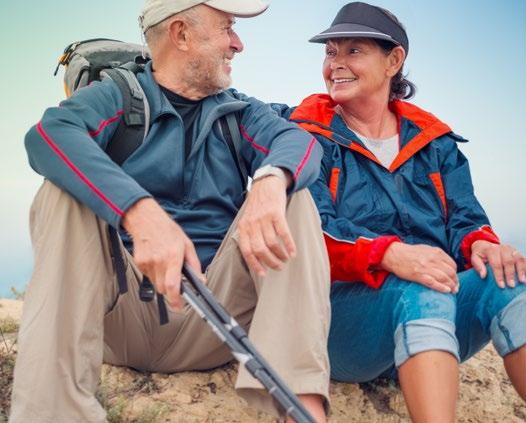
Here is a handful of tracks that you should add to your to-do list – plus, a couple of routes that you can do on two wheels, too.
Tomaree Head Summit, Shoal Bay
Distance: 2.2km (return)
Time: 1 hour 30 minutes to 2 hours
Difficulty: Medium to Hard
Take the invigorating walk to the summit of Tomaree Head, 161m above the Port Stephens entrance. Enjoy unparalleled views from the top.
Fort Tomaree, Shoal Bay
Distance: 2.5km (return)
Time: 1 hour to 1 hour 30 minutes
Difficulty: Medium
This easy walk on a paved track around the lower slopes of Tomaree Head brings you face-to-face with local military heritage – World War II Gun emplacements from 1941.
Native Flora Gardens, Nelson Bay
Distance: 1km
Time : 30 minutes to 1 hour
Difficulty: Easy
These gardens feature local and Australian native plants, diverse bird life, steps and pathways (some water views). There’s a number of Aboriginal canoe trees in and around the gardens. Formerly the site of HMAS Assault from 1942 to 1945.
Wreck Beach, Shoal Bay
Distance: 2km (return)
Time: 30 minutes to 1 hour
Difficulty: Easy
This easy walk to Wreck Beach, through a lush coastal Angophora forest, leads onto a small cove with beautiful sand and open views of the ocean.
Distance: 3km (return)
Time: 1 hour to 1 hour 30 minutes
Difficulty: Easy
Backed by sand dunes and bushland, favourable for swimming, surfing and sunbathing the beach is an easy stroll along the sand and be sure to keep an eye out for sea life such as whales and dolphins.
Big Rocky, Fingal Bay
Distance: 2.8km (return)
Time: 1 hour
Difficulty: Medium
A sandy track leading to a rocky headland – ideal at low tide.
You can purchase a bushwalks around Port Stephens booklet at the Nelson Bay Visitor Information Centre.
David Sams is in his element surrounded by offcuts and objects in the process of being repaired or repurposed. It’s perhaps no surprise given his upbringing in an era when value was placed on being resourceful and making do with what was available.
“My dad brought me up to always fix things. You either fixed things or you made them into something else.”
On cue, David glances around his office at the Salamander Bay Recycle Centre, a not-for-profit organisation he founded in 1994. “See that over there?” he points. “That was a lamp. I cut the top off it and now it’s a vase. You need to be creative with what you do.”
David has a larrikin smile and a cando attitude that’s infectious. He doesn’t like being in the spotlight, but his many years of community involvement mean he is a familiar and respected face in the Bay.
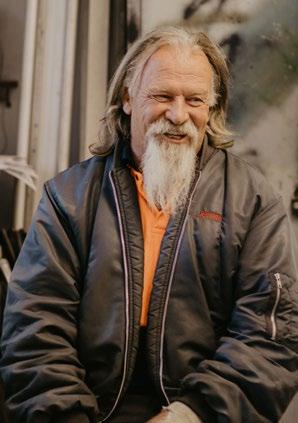
After moving to the area when he was ten and living here for 50 years, he is, he says with a laugh, “almost a local” and his passion for the area is palpable.
“In the early years, we were out all day, building cubbies, climbing trees, fishing and swimming. Mum would always say we had to be home for lunch and before the lights came on at night. I used to walk to school and I loved it. School was good for the social bits.”
Those early experiences forged David’s strong sense of community, which was further honed when he started volunteering with Nelson Bay Lions in his late teens. His formative years spent fixing things and helping others became crucial skills in a workplace that holds fond memories from when he was a kid.
“My dad would always come to this tip. He’d bring in a trailer of stuff and take a trailer of stuff back home again.”
“My dad would always come to this tip. He’d bring in a trailer of stuff and take a trailer of stuff back home again.”
Dave Sams
Reusing and repurposing materials, combined with the help of many volunteers, has transformed the centre from a set of plans and “an old chook shed” to a renowned Community Recycling Enterprise. Salamander Recycling diverts thousands of tonnes of waste from landfill, houses a unique vintage shopping experience, and a popular and productive Men’s Shed.
Over the years, the team has come across some unusual discarded items including false teeth that “kicked around for a while” but have since gone missing and, heartbreakingly, a collection of war medals. David is at the coal face of our throwaway society, and constantly amazed at what people dump into skip bins.
Crucially, the Salamander Recycle Centre also provides ongoing work experience and volunteer opportunities.
“A lot of what is here is from volunteers and their ideas,” David says.
“Volunteering is social networking. It stops you being at home and being on your own. There’s a lot of knowledge sharing, but it’s more than that. Sometimes if you’ve got something bothering you, you can have a chat and get an answer.”
Looking around the room, framed by the awards and certificates he’s received for a lifetime of community service, David touches on just how much that connection can mean.
“It might be something simple. Everyone comes in and sits here. It isn’t a lunchroom, but we just talk about stuff. People will say something and you’ll laugh your head off.”
It’s not only objects that David Sams transforms. He has faced debilitating challenges in his personal life, yet somehow manages to face up to those experiences and use what he has encountered to help others who may be struggling. Although he now walks with crutches due to a condition known as hereditary spastic paraparesis, he tries to focus on the positives.
“If I wasn’t going through this, I probably would have gone down a different track; I would have been a lot wilder,” he laughs. “It’s what you make out of life. It doesn’t stop me doing things. It’s actually made me appreciate what people can do. When I see other people struggling, I think, that’s what I do too, but we can still manage to do things. We can get through it.”
Realising there was a profound lack of understanding about suicide and its repercussions following the tragic death of his son, David co-founded and also volunteers with the Port Stephens Suicide Prevention Network. The network has created Solace Place at Boat Harbour and the annual ‘Walk With Us’ event that offers a space to reflect and seek solace.
“Suicide is not something you can’t talk about,” David says. “You should be able to talk about it. Listening is important. A lot of people don’t listen. People hide a lot of stuff.”
Hope for the future is something that David Sams embraces, though when asked what the benefits are of getting older he bursts into his charismatic chuckle and says, “bloody none!”
On reflection, he takes a softer line and admits that the nicest part about
getting older is spending time with his grandkids. “I look after my grandson on Sundays and I enjoy it. Now I’ve reached this age, I can spend time with him and show him things. Hopefully he’s learning. I know he is.”
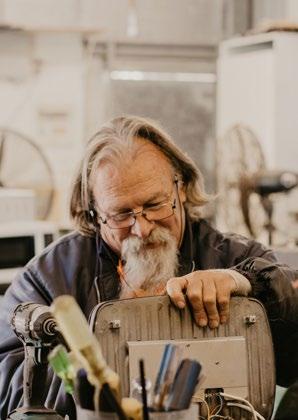
They spend all day outdoors, just like David did when he was a kid.
“We spend hours at the skate park … me on my scooter, watching him. And it comes back to that idea of giving back. Of volunteering. When you volunteer, you are making something for their future. For them.”
Author: Joanna Atherfold FinnThis companion driving service offers passengers safe, friendly assistance for the daily needs – pick up and return. Peace of mind every time. Call 0498 012 325 or email nelsonbay@drivingmissdaisy.com.au
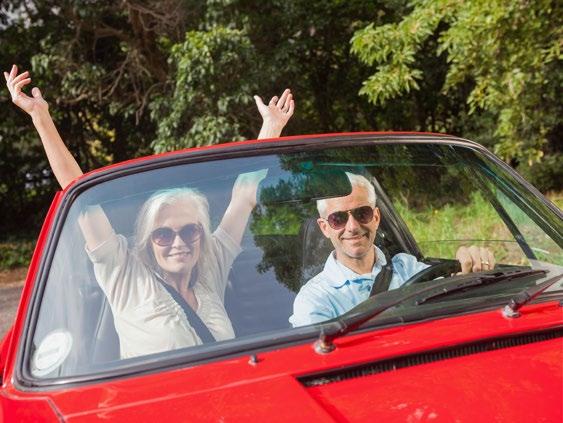
Linked Community Services
Linked Community Services provide clients with safe, reliable and careful transport so you can get out and about. They also assist Aboriginal and Torres Strait Islander people who are over 50 years of age, have a disability that affects mobility (permanent or temporary) or are a carer can use this affordable and reliable transport service.
Call 4984 7999
Aged Care Ltd
Port Stephens Veterans & Citizens
Aged Care has been caring for the
community of Port Stephens for the past 35 years. Call 4981 4721 or email@harboursidehaven.com.au
The taxi transport subsidy scheme (TTSS) supports NSW residents who are unable to use public transport because of a severe and permanent disability. Vist service.nsw.gov.au
A special purpose taxi is available daily Monday to Friday and Friday and Saturday evenings. Advance bookings are recommended. Call 4984 6699
Discovering the sights of Port Stephens is straightforward with a local bus service, taxi services, car hire companies and coach tour operators. Visit transportnsw.info/operators
Tomaree
Tomaree Prostate Cancer Support Group provides transport support for men with prostate cancer.
Call 0407 252 566 or email tomareeprostate@gmail.com
Unique Life Services provides affordable door-to-door transport assistance for consumers of all types in Nelson Bay. They can help get you to and from medical appointments, social events, activities like gym, swimming and sports, as well as everyday obligations like shopping and banking.
Call 1300 802 060 or visit uniquelifeservices.com.au
Port Stephens offers a wide range of mobility restricted facilities and activities from shopping and medical facilities to easy walks, cycleways and beach access.
All Access Beach – Fingal Beach
Fingal Beach is an all access beach with a mobi-mat beach access mat, which allows access for all wheeled chairs including ordinary wheelchairs, strollers and the like. Fingal Beach also has beach wheelchairs which can be loaned out free of charge. Contact: Fingal Beach Surf Life Saving 4981 1450 or Fingal Bay Holiday Park 4988 0990
Mobility Parking
There’s a number of Disability Parking spaces available in the Port Stephens area. A Mobility Permit Holder can park in spaces marked with a symbol for people with disabilities. The permit also provides parking concessions in other spaces if a marked space is unavailable. Mobility parking permits are coordinated through your doctor and Service NSW. Call 13 77 88
Port Stephens Walking Paths
Situated all around the Port Stephens area are wide walking and cycle paths. These paths are easy walking and wheelchair accessible that cover our lovely coast line, offering great views of the bay.
One at the base of Tomaree Headland also takes in the remnants of the old Fort Tomaree torpedo tubes.
Public MLAK accessible toilets
Port Stephens area has a number of public MLAK accessible toilets. These sites include:
• Nelson Bay Visitor Information Centre, 60 Victoria Parade Nelson Bay
• Nelson Bay beach next to the Cruise Booking Office, Victoria Parade, Nelson Bay
• Little Beach, Dixon Street
• Corlette – on the beach near corner of Foreshore Drive and Sandy Point Road
• Anna Bay Shops
• Fingal Bay Rugby Club
• Bagnalls Beach
• Roy Wood Reserve, Corlette
MLAK keys can be purchased from Council.
Shopping Centre Wheelchair at Salamander Bay
A wheelchair can be borrowed for shopping and is available from the Salamander Shopping Centre Central office. Call 4982 0066
Water Wheelchair and Beach Access Ramp, Little Beach
Council offers a disability access ramp at Little Beach, Nelson Bay which provides access to the water via a water wheelchair. The beach boasts lovely golden sand and disability play equipment, making this a perfect spot for families to enjoy the Bay.
